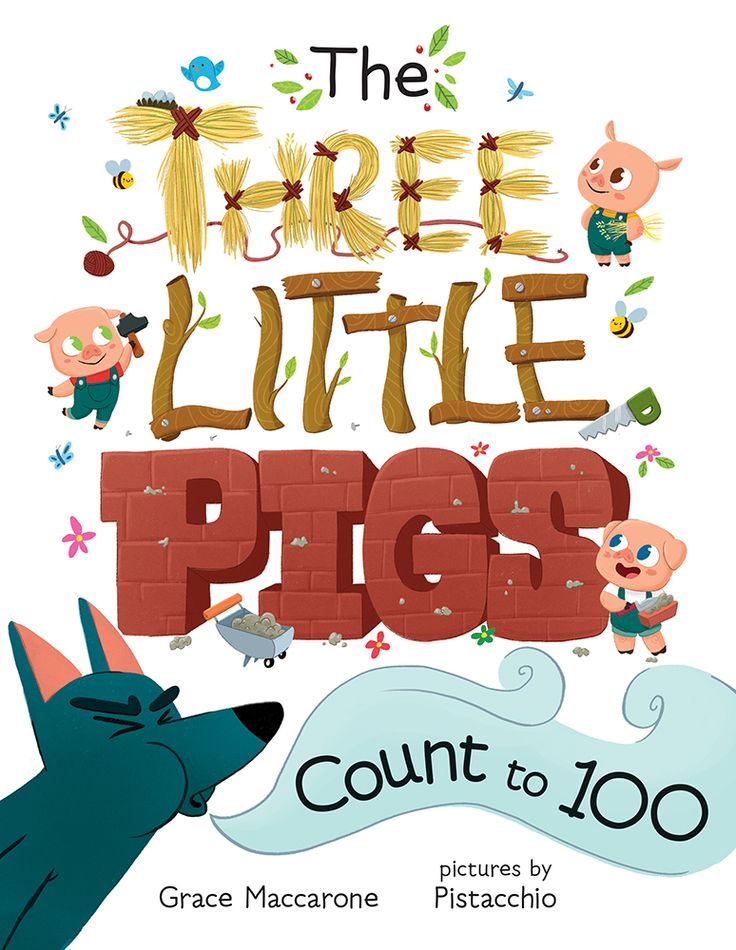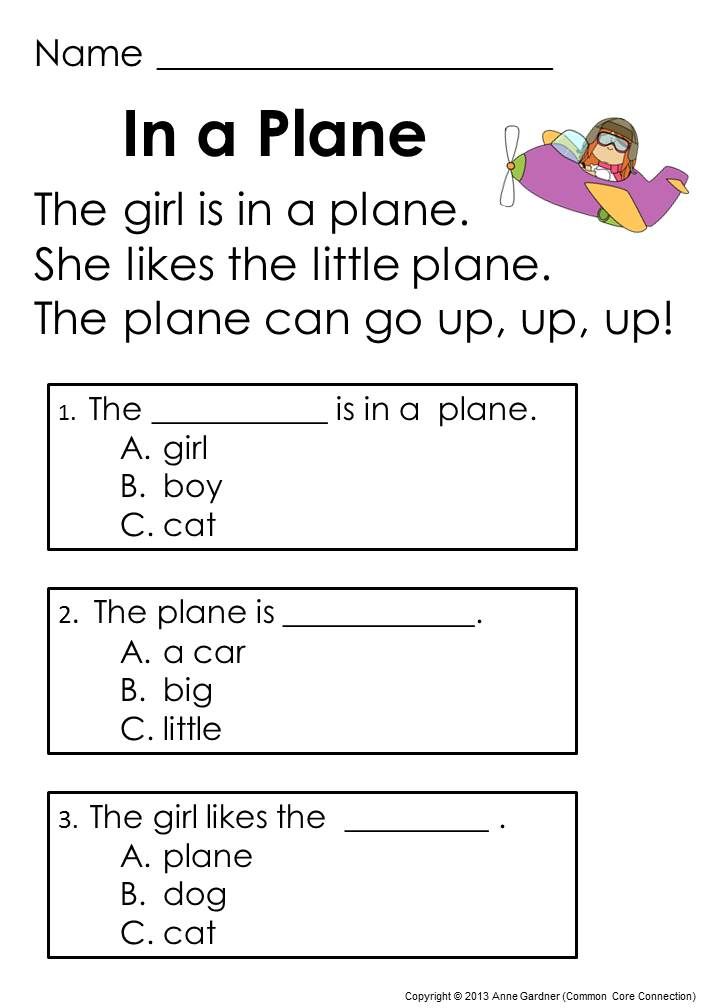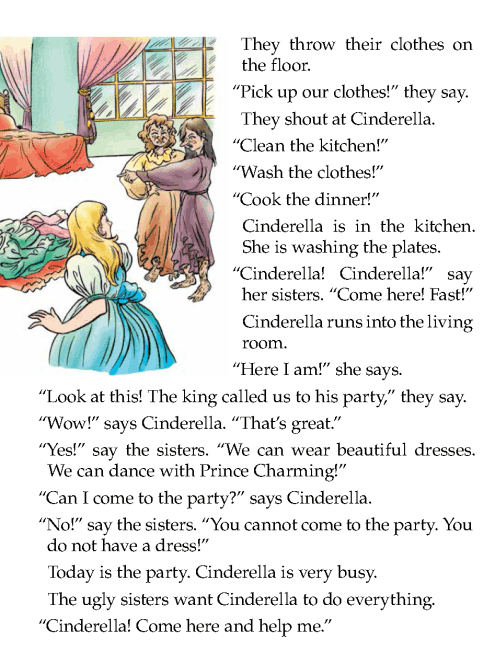Three little pigs original
Story The Three Little Pigs by author Unknown, available online since 4 years and 6 months - **The Three
**The Three Little Pigs was first published in 1840, but the origin of this story is believed to be much older than the 19th century.
Once upon a time there was an old Sow with three little Pigs, and as she had not enough to keep them, she sent them out to seek their fortune.
The first that went off met a Man with a bundle of straw, and said to him, "Please, Man, give me that straw to build me a house"; which the Man did, and the little Pig built a house with it. Presently came along a Wolf, and knocked at the door, and said, "Little Pig, little Pig, let me come in."
To which the Pig answered, "No, no, by the hair of my chinny chin chin."
"Then I'll huff and I'll puff, and I'll blow your house in!" said the Wolf. So he huffed and he puffed, and he blew his house in, and ate up the little Pig.
The second Pig met a Man with a bundle of furze, and said, "Please, Man, give me that furze to build a house"; which the Man did, and the Pig built his house.
Then along came the Wolf and said, "Little Pig, little Pig, let me come in."
"No, no, by the hair of my chinny chin chin."
"Then I'll puff and I'll huff, and I'll blow your house in!" So he huffed and he puffed, and he puffed and he huffed, and at last he blew the house down, and ate up the second little Pig.
The third little Pig met a Man with a load of bricks, and said, "Please, Man, give me those bricks to build a house with"; so the Man gave him the bricks, and he built his house with them. So the Wolf came, as he did to the other little Pigs, and said, "Little Pig, little Pig, let me come in."
"No, no, by the hair of my chinny chin chin."
"Then I'll huff and I'll puff, and I'll blow your house in."
Well, he huffed and he puffed, and he huffed and he puffed, and he puffed and he huffed; but he could not get the house down. When he found that he could not, with all his huffing and puffing, blow the house down, he said, "Little Pig, I know where there is a nice field of turnips. "
"
"Where?" said the little Pig.
"Oh, in Mr. Smith's home-field; and if you will be ready to-morrow morning, I will call for you, and we will go together and get some for dinner."
"Very well," said the little Pig, "I will be ready. What time do you mean to go?"
"Oh, at six o'clock."
Well, the little Pig got up at five, and got the turnips and was home again before six. When the Wolf came he said, "Little Pig, are you ready?"
"Ready!" said the little Pig, "I have been and come back again, and got a nice pot-full for dinner."
The Wolf felt very angry at this, but thought that he would be up to the little Pig somehow or other; so he said, "Little Pig, I know where there is a nice apple-tree."
"Where?" said the Pig.
"Down at Merry-garden," replied the Wolf; "and if you will not deceive me I will come for you, at five o'clock to-morrow, and we will go together and get some apples."
Well, the little Pig woke at four the next morning, and bustled up, and went off for the apples, hoping to get back before the Wolf came; but he had farther to go, and had to climb the tree, so that just as he was coming down from it, he saw the Wolf coming, which, as you may suppose, frightened him very much.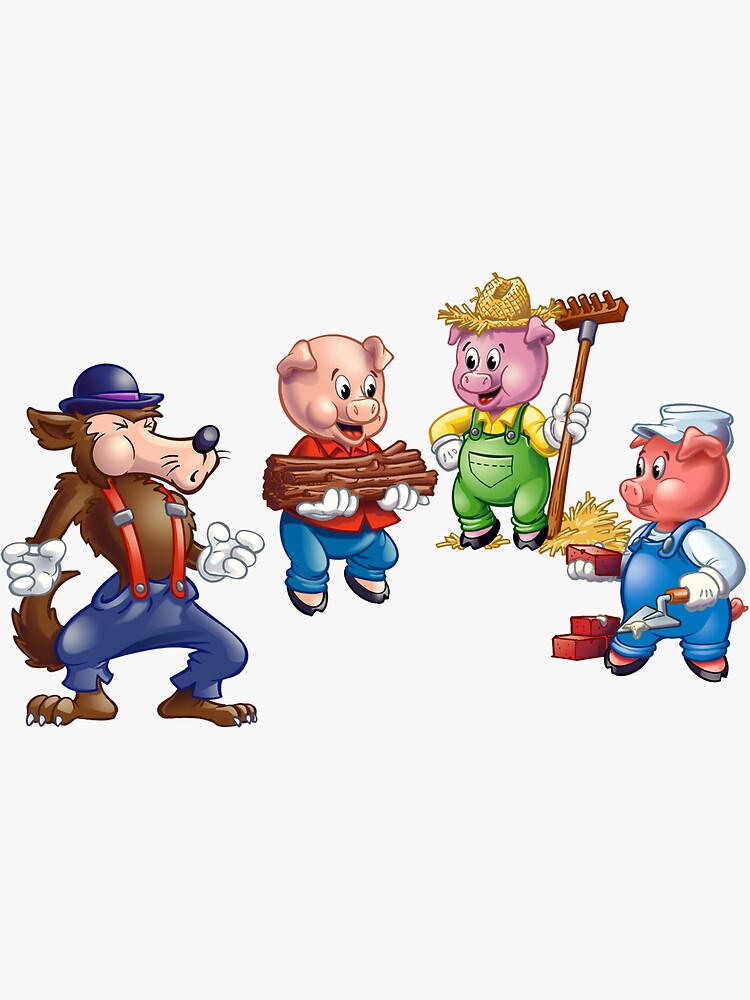 When the Wolf came up he said, "Little Pig, what! are you here before me? Are they nice apples?"
When the Wolf came up he said, "Little Pig, what! are you here before me? Are they nice apples?"
"Yes, very," said the little Pig; "I will throw you down one." And he threw it so far that, while the Wolf was gone to pick it up, the little Pig jumped down and ran home.
The next day the Wolf came again, and said to the little Pig, "Little Pig, there is a Fair in the Town this afternoon: will you go?"
"Oh, yes," said the Pig, "I will go; what time shall you be ready?"
"At three," said the Wolf.
So the little Pig went off before the time, as usual, and got to the Fair, and bought a butter churn, and was on his way home with it when he saw the Wolf coming. Then he could not tell what to do. So he got into the churn to hide, and in doing so turned it round, and it began to roll, and rolled down the hill with the Pig inside it, which frightened the Wolf so much that he ran home without going to the Fair.
He went to the little Pig's house, and told him how frightened he had been by a great round thing which came down the hill past him.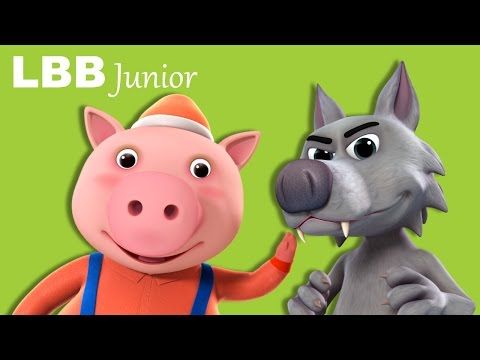
Then the little Pig said, "Hah! I frightened you, did I? I had been to the Fair and bought a butter churn, and when I saw you I got into it, and rolled down the hill."
Then the Wolf was very angry indeed, and declared he would eat up the little Pig, and that he would get down the chimney after him.
When the little Pig saw what he was about, he hung on the pot full of water, and made up a blazing fire, and, just as the Wolf was coming down, took off the cover of the pot, and in fell the Wolf. And the little Pig put on the cover again in an instant, boiled him up, and ate him for supper, and lived happy ever after.
The Three Little Pigs
"The Three Little Pigs" is a fairy tale that children become familiar with at an early age. It is a fable because it has a moral message and involves animals. The story conveys warnings about laziness and advocates building strong shelters and not settling for cheap materials. There are multiple versions of the story involving three pigs being hunted by a wolf.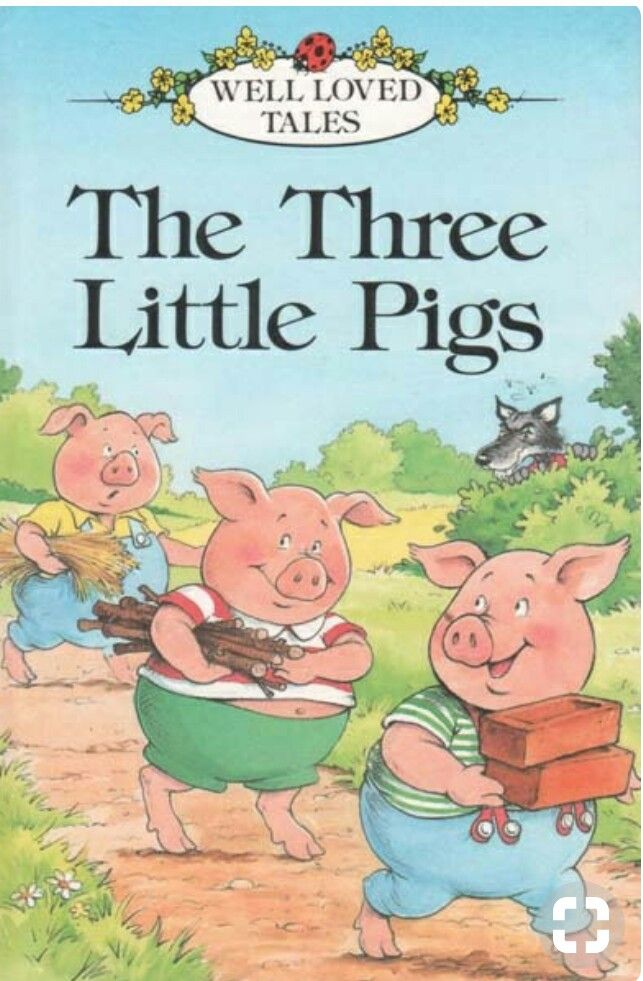
The story was first seen in English fairy tale books from the 19th century. It is on our list of classic children's short stories.
In the familiar tale three little pigs are sent off into the world by their mother. Each pig builds a house. One builds a house of straw, one builds a house of sticks and one builds a far more sturdy house made of brick.
When a wolf comes after the picks he asks each pig to let him inside. The pigs refuse saying, "not by the hair on my chinny chin chin." The wolf then threatens, "Then I'll huff, and I'll puff, and I'll blow your house down." The wolf easily blows down the homes made of straw and sticks, but is unable to blow down the stronger and better made brick house. The first two pigs are eaten in the earliest versions of the tale. Only the third brick-laying pig survives. The first two pigs do not always die in some of the more recent versions of the tale. In some versions the pigs even end up eating the wolf.
There are multiple morals in this story.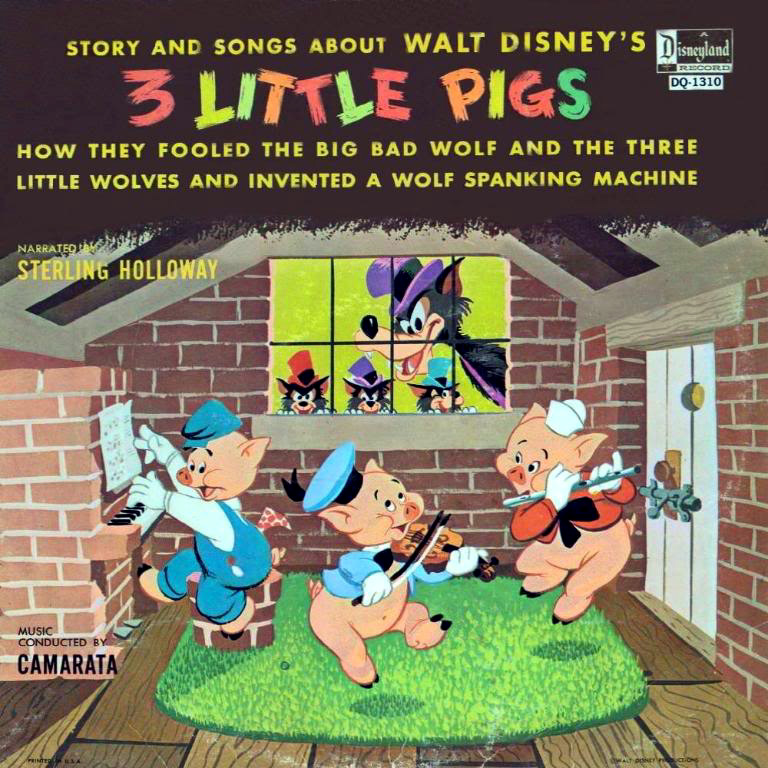 It illustrates the importance of hard work. It is worth the time and effort to build something good. The straw using pig says in the story that he will use the straw so he can do less work and have more time to relax. The pig was lazy and made a fatal error in judgement.
It illustrates the importance of hard work. It is worth the time and effort to build something good. The straw using pig says in the story that he will use the straw so he can do less work and have more time to relax. The pig was lazy and made a fatal error in judgement.
It also directly illustrates the importance of building a sturdy structure. The wolf could just as easily be a tornado or wind storm with the homes representing the types of homes people could build. A weak house would not be able to withstand some of the powerful storms England has received over the past couple centuries. A straw or stick house would be no match for a tornado.
Origins
"The Three Little Pigs" story was first published in The Nursery Rhymes of England by James Halliwell-Phillips in 1886 according to the Wikipedia entry. It was then published in English Fairy Tales by Joseph Jacobs in 1890. The tale likely predates these books and as with many fairy tales the original author is unknown.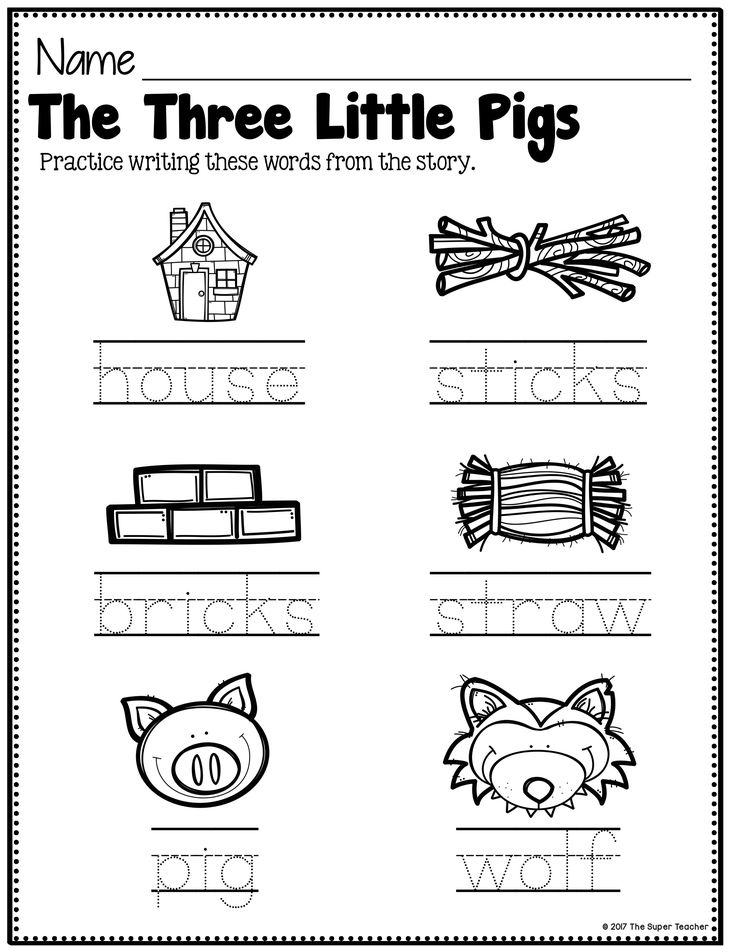
Later Versions
Classification and Similar Tales
"The Three Little Pigs" is classified as ATU 124 under the Aarne-Thompson-Uther Classification of Folk Tales. It fits into the "Wild Animals and Domestic Animals" folk tales category. You can view more tales that fall with this category here. There have been many stories that are similar to "The Three Little Pigs." Several of them are described here on SurLaLune.
"The Three Little Pigs" Online
Hardcover
There are many versions of "The Three Little Pigs" tale in bookstores. The book pictured above was illustrated by Mei Matsuoaka (Parragon Books) and can be found on Amazon.com.
The book pictured above was illustrated by Mei Matsuoaka (Parragon Books) and can be found on Amazon.com.
Three little pigs. Read online. English folk tale, edited by Sergei Mikhalkov
Tales
Printable version
Page. 1 || Page 2
Once upon a time there were three little pigs in the world. Three brothers. All of the same height, round, pink, with the same cheerful ponytails.
Even their names were similar. The piglets were called: Nif-Nif, Nuf-Nuf and Naf-Naf.
All summer they tumbled in the green grass, basked in the sun, basked in the puddles.
But autumn has come.
The sun was not so hot anymore, gray clouds stretched over the yellowed forest.
“It's time for us to think about winter,” Naf-Naf once said to his brothers, waking up early in the morning. - I'm shivering from the cold. We may catch a cold. Let's build a house and winter together under one warm roof.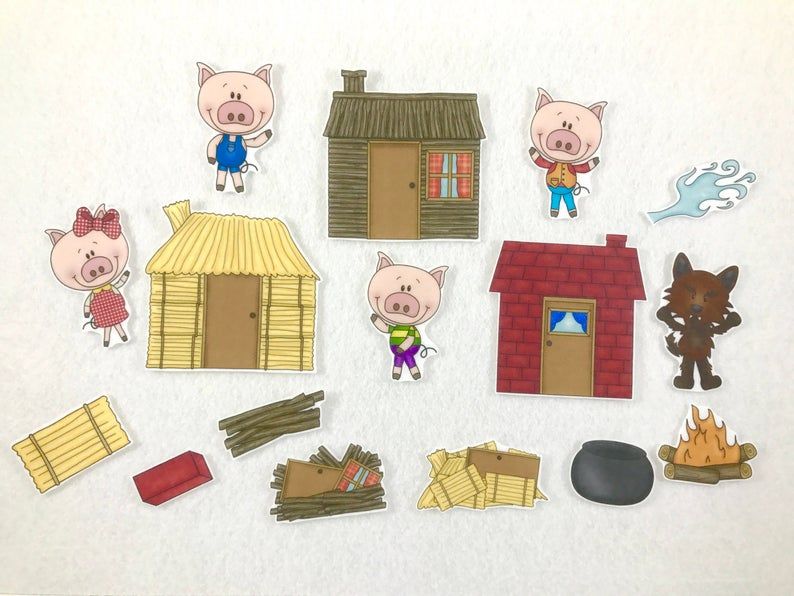
But his brothers didn't want to take the job. It is much more pleasant to walk and jump in the meadow on the last warm days than to dig the earth and carry stones.
- Good luck! Winter is still far away. We'll take a walk, - said Nif-Nif and rolled over his head.
— When necessary, I will build a house for myself, — said Nuf-Nuf and lay down in a puddle.
“Me too,” added Nif-Nif.
- Well, as you wish. Then I will build my own house, - said Naf-Naf. “I won't wait for you.
It was getting colder and colder every day. But Nif-Nif and Nuf-Nuf were in no hurry. They didn't even want to think about work. They were idle from morning to evening. All they did was play their pig games, jump and roll.
“Today we will take a walk,” they said, “and tomorrow morning we will get down to business.
But the next day they said the same thing.
And only when a large puddle near the road began to be covered with a thin crust of ice in the morning, the lazy brothers finally set to work.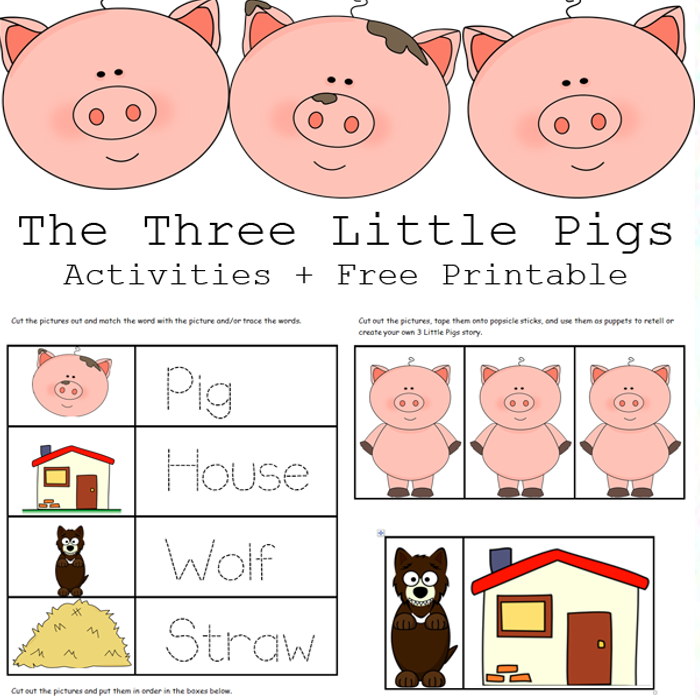
Nif-Nif decided that it would be easier and most likely to make a house out of straw. Without consulting anyone, he did just that. By evening, his hut was ready.
Nif-Nif put the last straw on the roof and, very pleased with his house, sang merrily:
You'll get around half the world,
You'll get around, you'll get around,
You won't find a better home,
You won't find it, you won't find it!
Singing this song, he went to Nuf-Nuf.
Nuf-Nuf was also building a house not far away.
He tried to put an end to this boring and uninteresting business as soon as possible. At first, like his brother, he wanted to build a house out of straw. But then I decided that it would be very cold in such a house in winter. The house will be stronger and warmer if it is built from branches and thin rods. And so he did.
He drove stakes into the ground, intertwined them with rods, heaped dry leaves on the roof, and by evening the house was ready.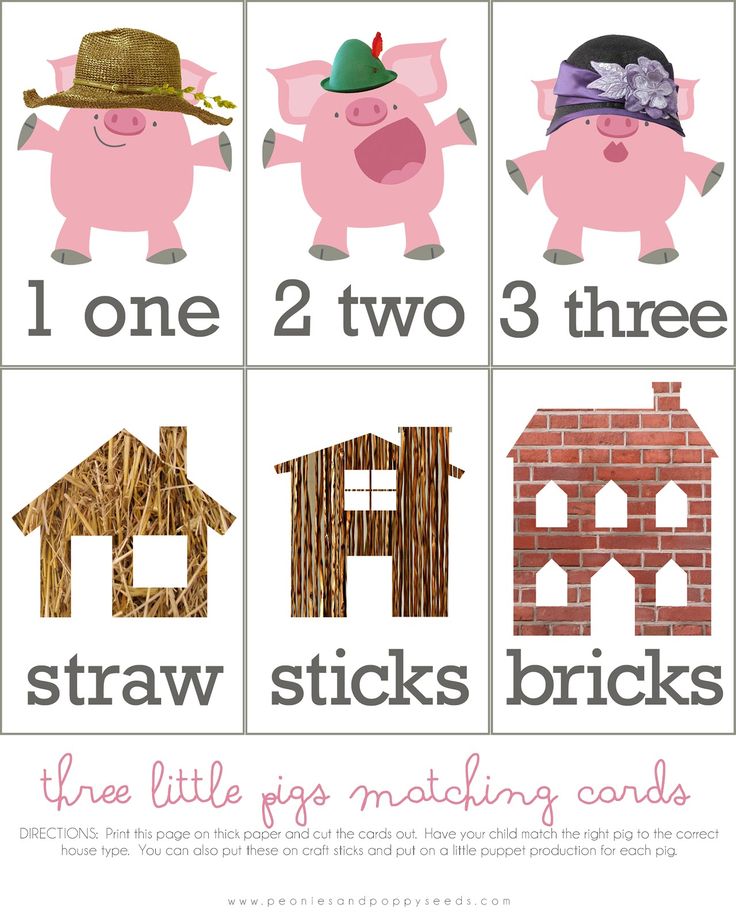
Nuf-Nuf proudly walked around him several times and sang:
I have a good house,
A new house, a solid house.
I'm not afraid of rain and thunder,
Rain and thunder, rain and thunder!
Before he could finish the song, Nif-Nif ran out from behind a bush.
— Well, your house is ready! - said Nif-Nif to his brother. "I told you we'd get it over with quickly!" Now we are free and can do whatever we want!
— Let's go to Naf-Naf and see what kind of house he built for himself! - said Nuf-Nuf. "We haven't seen him in a long time!"
- Let's go and see! Nif-Nif agreed.
And both brothers, very pleased that they had nothing to worry about, hid behind the bushes.
Naf-Naf has been busy building for several days now. He dragged stones, kneaded clay, and now slowly built himself a reliable, durable house in which one could hide from wind, rain and frost.
He made a heavy oak door with a bolt in the house so that the wolf from the neighboring forest could not climb into it.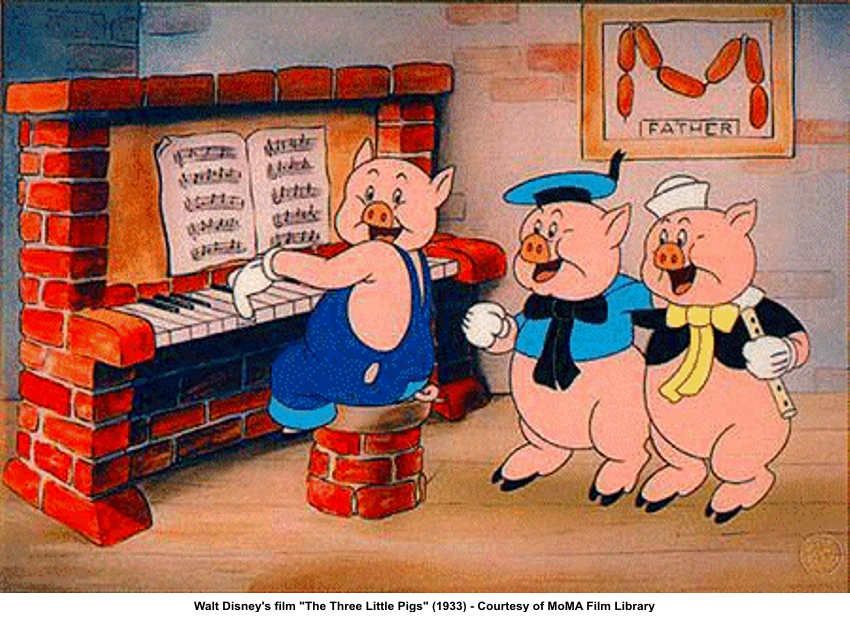
Nif-Nif and Nuf-Nuf found their brother at work.
— What are you building? - the surprised Nif-Nif and Nuf-Nuf shouted in one voice. - What is it, a pig house or a fortress?
- Piglet's house should be a fortress! Naf-Naf calmly answered them, continuing to work.
— Are you going to fight with someone? Nif-Nif grunted merrily and winked at Nuf-Nuf.
And both brothers were so merry that their squeals and grunts carried far across the lawn.
And Naf-Naf, as if nothing had happened, continued to lay the stone wall of his house, humming a song under his breath:
Of course, I'm smarter than everyone,
Smarter than everyone, smarter than everyone!
I build a house from stones,
From stones, from stones!
No animal in the world,
A cunning beast, a terrible beast,
Will not burst into this door,
Into this door, into this door!
— What animal is he talking about? - Nif-Nif asked Nuf-Nif.
— What animal are you talking about? - Nuf-Nuf asked Naf-Naf.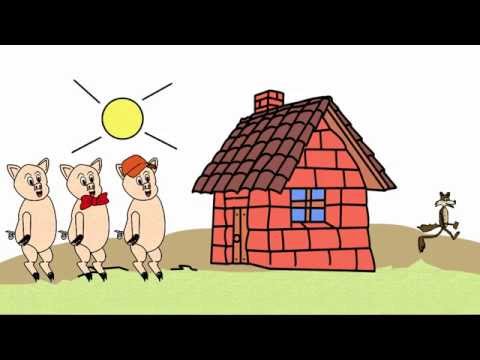
- I'm talking about the wolf! - answered Naf-Naf and laid another stone.
- Look how afraid he is of the wolf! - said Nif-Nif.
- He's afraid of being eaten! - added Nuf-Nuf. And the brothers cheered even more.
- What kind of wolves can be here? - said Nif-Nif.
- There are no wolves! He's just a coward! - added Nuf-Nuf. And they both began to dance and sing:
We are not afraid of the gray wolf,
Gray wolf, gray wolf!
Where do you go, stupid wolf,
Old wolf, dire wolf?
They wanted to tease Naf-Naf, but he didn't even turn around.
- Let's go, Nuf-Nif, - said then Nif-Nif. “We have nothing to do here! And two brave brothers went for a walk. On the way they sang and danced, and when they entered the forest, they made such a noise that they woke up the wolf, who was sleeping under a pine tree.
— What's that noise? - An angry and hungry wolf grumbled with displeasure and galloped to the place where the squealing and grunting of two stupid little piglets could be heard.
- What kind of wolves can be here! - said at that time Nif-Nif, who saw wolves only in pictures.
- Here we will grab him by the nose, he will know! added Nuf-Nuf, who also had never seen a live wolf.
And the brothers rejoiced again and sang:
We are not afraid of the gray wolf,
Gray wolf, gray wolf!
Where do you go, stupid wolf,
Old wolf, dire wolf?
And suddenly they saw a real live wolf!
He stood behind a large tree, and he had such a terrible look, such evil eyes and such a toothy mouth that a chill ran down Nif-Nif and Nuf-Nuf's backs and thin tails trembled finely. The poor pigs couldn't even move for fear.
The wolf prepared to jump, snapped his teeth, blinked his right eye, but the piglets suddenly came to their senses and, screeching throughout the forest, rushed to their heels. They have never run so fast before! Flashing with their heels and raising clouds of dust, they each rushed to their home.
Nif-Nif was the first to reach his thatched hut and barely managed to slam the door in front of the wolf's very nose.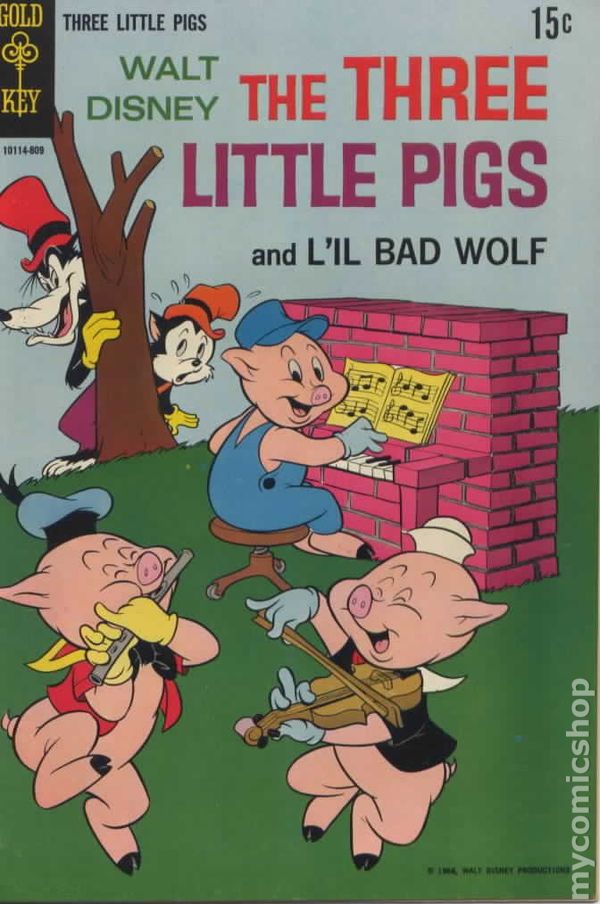
— Unlock the door now! the wolf growled. "Or else I'll break it!"
— No, — grunted Nif-Nif, — I won't unlock it!
The breath of a terrible beast was heard outside the door.
— Unlock the door now! the wolf growled again. “Otherwise I’ll blow so hard that your whole house will fly apart!”
But Nif-Nif, out of fear, could no longer answer anything. Then the wolf began to blow: "F-f-f-w-w-w!"
Straws flew from the roof of the house, the walls of the house shook.
The wolf took another deep breath and blew a second time: "F-f-f-w-w-w!"
When the wolf blew for the third time, the house blew in all directions, as if it had been hit by a hurricane. The wolf snapped his teeth in front of the little piglet's snout.
But Nif-Nif deftly dodged and rushed to run, in a minute he was already at the door of Nuf-Nuf.
As soon as the brothers had locked themselves in, they heard the wolf's voice:
— Well, now I'll eat you both!
Nif-Nif and Nuf-Nuf looked at each other in fear.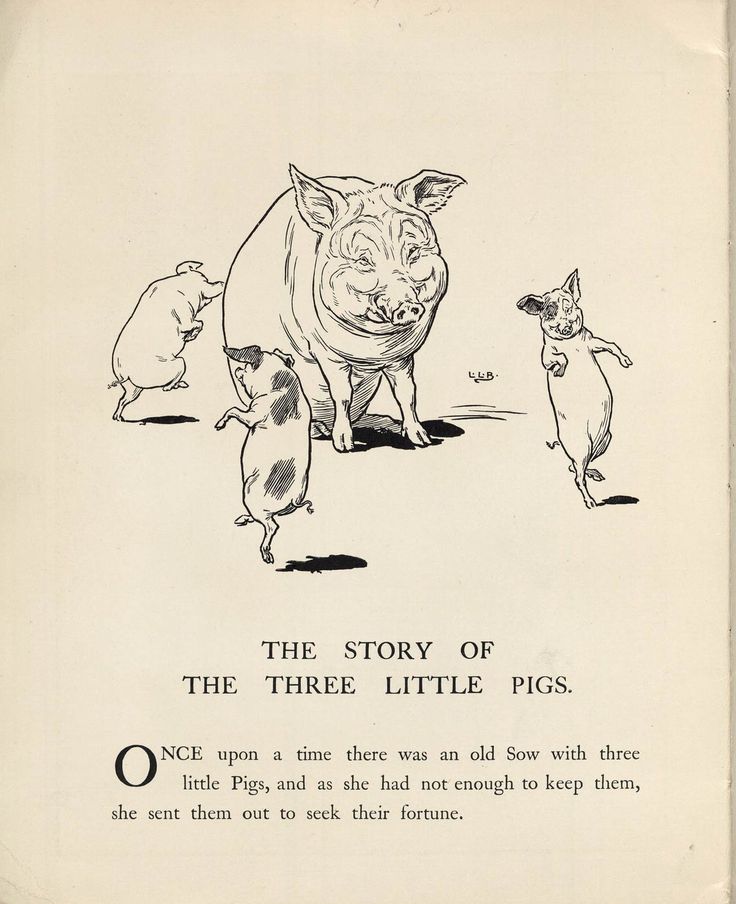 But the wolf was very tired and therefore decided to go for a trick.
But the wolf was very tired and therefore decided to go for a trick.
- I changed my mind! he said so loudly that he could be heard in the house. “I won’t eat those skinny piglets!” I better go home!
Did you hear? - Nif-Nif asked Nuf-Nif. He said he won't eat us! We are skinny!
— This is very good! - Nuf-Nuf said and immediately stopped trembling.
The brothers became very cheerful, and they sang as if nothing had happened:
We are not afraid of the gray wolf,
Gray wolf, gray wolf!
Where do you go, stupid wolf,
Old wolf, dire wolf?
And the wolf didn't even think of leaving. He just stepped aside and hunkered down. He was very funny. He had a hard time keeping himself from laughing. How cleverly he deceived two stupid little pigs!
When the pigs were completely calm, the wolf took the sheep's skin and cautiously crept up to the house. At the door, he covered himself with skin and knocked softly.
Nif-Nif and Nuf-Nuf were very frightened.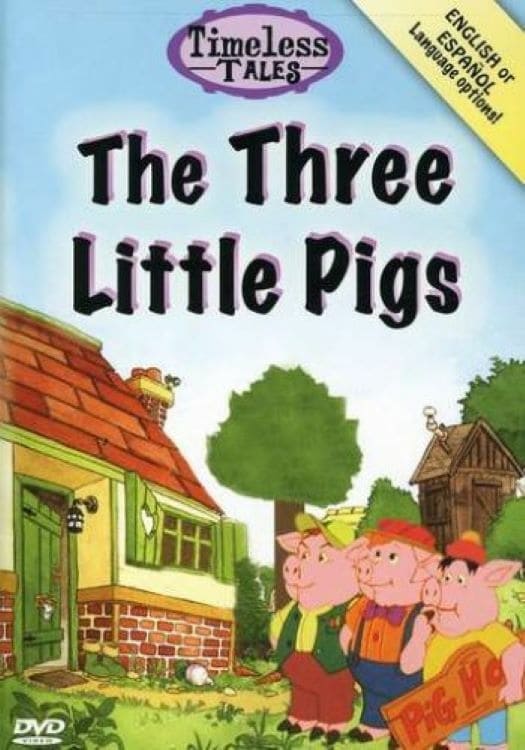
Who is there? they asked, their tails shaking again.
- It's me, me, poor little sheep! the wolf squeaked in a thin, alien voice. - Let me spend the night, I strayed from the herd and very tired!
— Let me in? the good Nif-Nif asked his brother.
- You can let the sheep go! Nuf-Nuf agreed. - A sheep is not a wolf!
But when the pigs opened the door, they saw not a sheep, but the same toothy wolf. The brothers slammed the door and leaned on it with all their might so that the terrible beast could not break into them.
The wolf got very angry. He failed to outsmart the pigs. He threw off his sheepskin and growled:
— Well, wait a minute! There will be nothing left of this house!
And he began to blow. The house leaned a little. The wolf blew a second, then a third, then a fourth time.
Leaves were falling from the roof, the walls were trembling, but the house was still standing.
And only when the wolf blew for the fifth time, the house staggered and collapsed.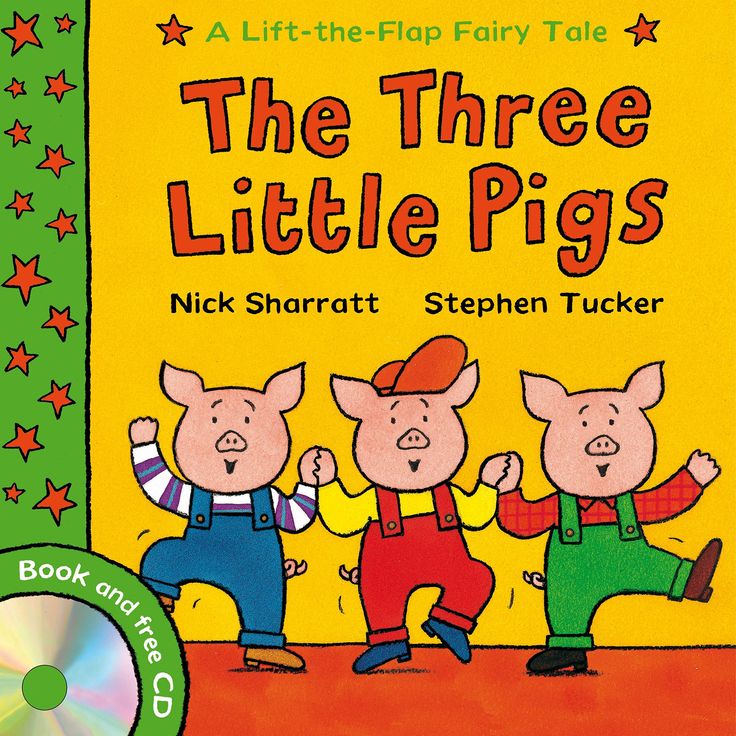 Only one door still stood for some time in the middle of the ruins.
Only one door still stood for some time in the middle of the ruins.
The piglets ran away in terror. Their legs were paralyzed with fear, every bristle trembled, their noses were dry. The brothers rushed to the house of Naf-Naf.
The wolf overtook them with huge leaps. Once he almost grabbed Nif-Nif by the hind leg, but he pulled it back in time and added speed. The wolf stepped up too. He was sure that this time the piglets would not run away from him.
But he was out of luck again.
The piglets quickly rushed past a large apple tree without even hitting it. But the wolf did not have time to turn and ran into an apple tree, which showered him with apples. One hard apple hit him between the eyes. A large lump jumped up on the wolf's forehead.
And Nif-Nif and Nuf-Nuf, neither alive nor dead, ran up at that time to the house of Naf-Naf.
Brother let them into the house. The poor piglets were so frightened that they could not say anything. They silently rushed under the bed and hid there. Naf-Naf immediately guessed that a wolf was chasing them. But he had nothing to fear in his stone house. He quickly bolted the door, sat down on a stool and sang loudly:
Naf-Naf immediately guessed that a wolf was chasing them. But he had nothing to fear in his stone house. He quickly bolted the door, sat down on a stool and sang loudly:
No animal in the world,
Cunning animal, terrible animal,
Won't open this door,
This door, this door!
But just then there was a knock on the door.
Who is knocking? Naf-Naf asked in a calm voice.
- Open without talking! came the rough voice of the wolf.
- No matter how! And I don't think so! - Naf-Naf answered in a firm voice.
— Oh, yes! Well, hold on! Now I'll eat all three!
- Try it! - answered Naf-Naf from behind the door, not even getting up from his stool. He knew that he and his brothers had nothing to fear in a solid stone house.
Then the wolf sucked in more air and blew as hard as he could! But no matter how much he blew, not even the smallest stone moved.
The wolf turned blue from the effort.
The house stood like a fortress.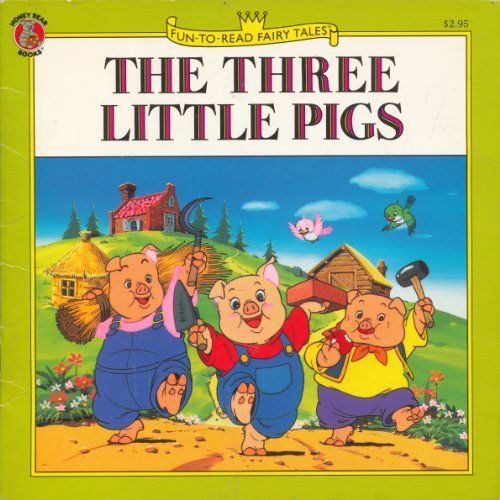 Then the wolf began to shake the door. But the door didn't budge either.
Then the wolf began to shake the door. But the door didn't budge either.
The wolf, out of anger, began to scratch the walls of the house with his claws and gnaw the stones from which they were built, but he only broke off his claws and ruined his teeth. The hungry and angry wolf had no choice but to get out. But then he raised his head and suddenly noticed a large, wide chimney on the roof.
- Yeah! Through this pipe I will make my way into the house! the wolf rejoiced. He carefully climbed onto the roof and listened. The house was quiet. “I’ll still have a snack today with fresh piglet,” the wolf thought, and, licking his lips, climbed into the pipe.
But as soon as he began to descend the pipe, the piglets heard a rustle. And when soot began to pour on the lid of the boiler, smart Naf-Naf immediately guessed what was the matter. He quickly rushed to the cauldron, in which water was boiling on the fire, and tore off the lid from it.
- Welcome! - said Naf-Naf and winked at his brothers; Nif-Nif and Nuf-Nuf had already completely calmed down, and, smiling happily, looked at their smart and brave brother.
The piglets didn't have to wait long.
Black as a chimney sweep, the wolf flopped right into the boiling water.
His eyes popped out on his forehead, all his hair stood on end.
With a wild roar, the scalded wolf flew into the chimney back to the roof, rolled down it to the ground, rolled four times over his head, rode on his tail past the locked door and rushed into the forest.
And the three brothers, the three little pigs, looked after him and rejoiced that they had so cleverly taught the evil robber a lesson.
And then they sang their cheerful song:
You'll get around half the world,
You'll get around, you'll get around,
You won't find a better home,
You won't find it, you won't find it!
No animal in the world,
Cunning beast, terrible beast,
Won't open this door,
This door, this door!
The wolf from the forest will never,
Never, never,
Will not return to us here,
To us here, to us here!
Since then, the brothers began to live together under one roof.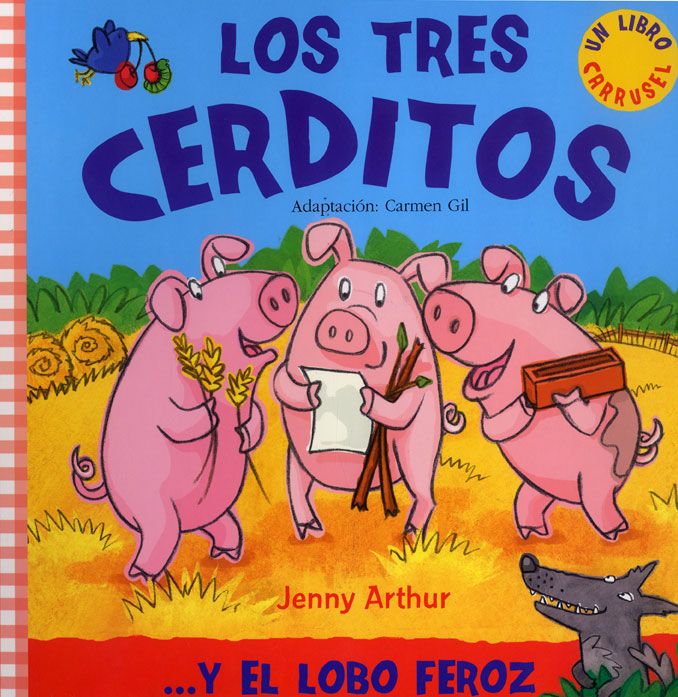
That's all we know about the three little pigs - Nif-Nif, Nuf-Nuf and Naf-Naf.
Gyula Urban. The envious piggy bank of Shampoosli. Polest-fairy tale
Page 1 || Page 2
The Three Little Pigs in the original | Cognitive site Uznayka Com
The English folk tale "Three Little Pigs" is very well known all over the world and in our country, as if too. In fact, this tale in our country is known mainly in the retelling of Sergei Mikhalkov, and he, however, not only changed its meaning, but actually replaced it with a completely different one.
What happens in the fairy tale "Three Little Pigs" by Sergei Mikhalkov?..
All summer long, three little pigs frolicked carelessly on the lawn, and when autumn came, they were forced to start building houses.
Two little pigs were too lazy and built houses for themselves anyhow. One lazy pig built a house out of straw, the second lazy pig built a house out of twigs.
The third pig turned out to be the most industrious and built himself a solid house out of bricks.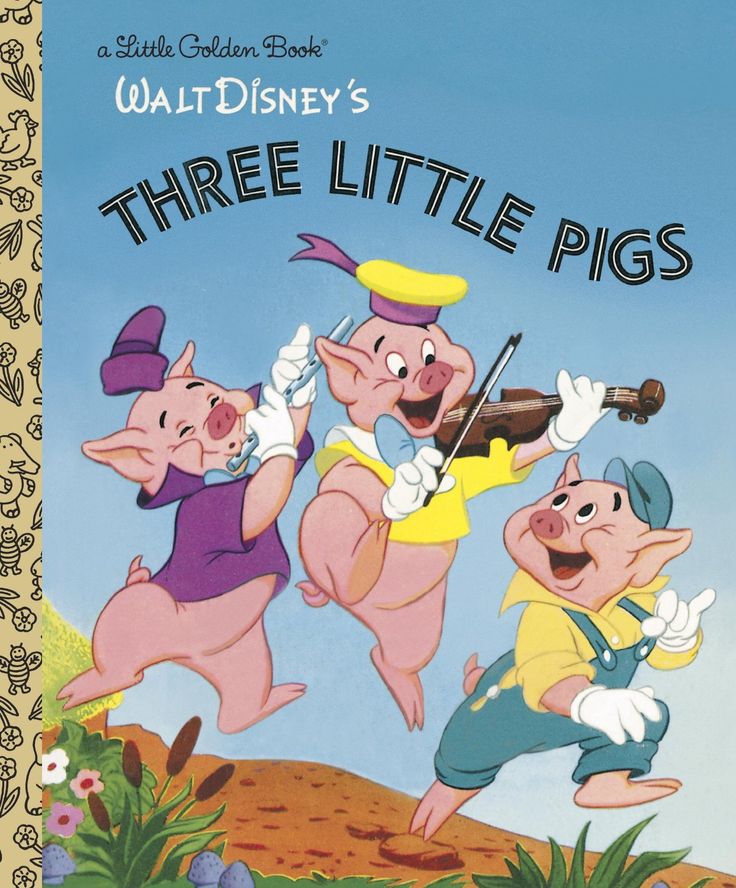
Then a wolf appeared and blew away the lazy piglets' houses, and they were forced to flee and hide in their industrious brother's sturdy house. Well, after that, the hardworking brother also figured out how to drive the wolf away forever.
The wolf climbed through the chimney into the oven, fell into a cauldron of boiling water, scalded himself and ran away forever. And all three piglets remained to live in a solid house of a hardworking brother.
Everything in this variant seems to be good: laziness is punished, friendship won, the unity of piglets and family relations.
In fact, in the original, English folk version, the main meaning of this tale is much tougher and much more useful for preparing the younger generation for life in our modern reality.
In the original version, the three little pigs grew up with their mother pig, and then one day it was time for them to continue building their lives on their own.
And the mother pig said to them, all three, this parting word: "Whatever you do, do it the best that you can because that "s the way to get along in the world", that is: "Whatever you do do it, do it in the best way, because this is the only way to live in this world".
Further, in the original, approximately the same thing happens as in the retelling of Sergei Mikhalkov. Only the wolf, having blown away the straw house and the house of twigs, immediately ate both lazy piglets .
And when he tried to get through the chimney into the house of an industrious piglet, he fell into a cauldron of boiling water, and there he perked up.
Then the industrious pig came to his mother pig, told her about what had happened, and she, without uttering a single word of regret about the two lazy pigs eaten, repeated almost the same thing again: “The way to get along in the world is to do things as well as you can" - "You can live in this world only if you do all things in the best possible way."
Let's think about it!
Twice this truth is repeated in the original fairy tale!
Twice!
This is the first thing.
Secondly, in it lazy and unwilling to "do all things in the best way" piglets simply die, and are not at all imposed on the neck of a hardworking and resourceful brother.